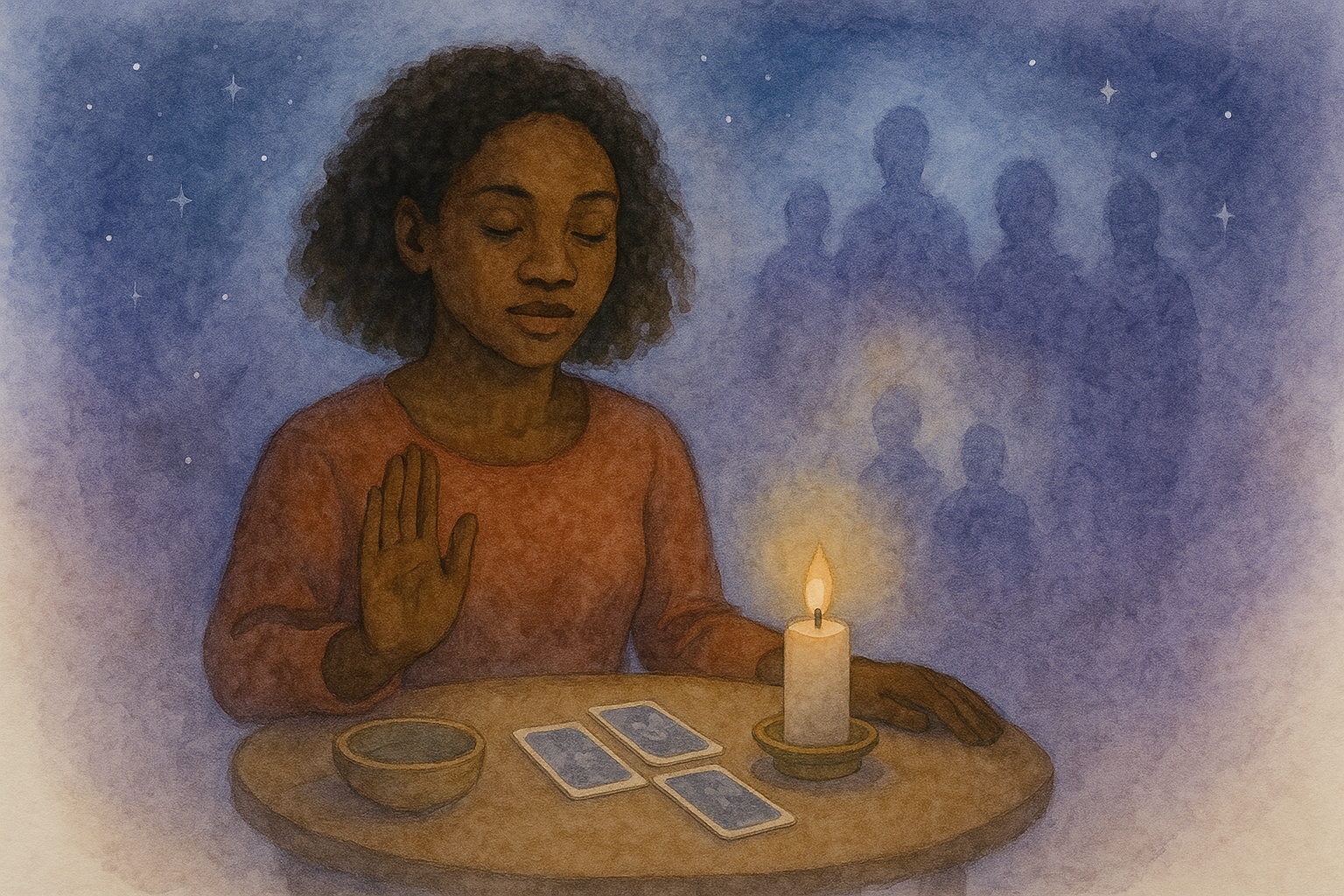Mediumship asks for even stronger boundaries because you’re holding space for the living while communicating with the dead. Without structure, it can feel chaotic—late-night “drop-ins,” crowded sensations, or emotional overwhelm. With structure, mediumship becomes orderly, ethical, and deeply healing for everyone involved.
Think of your practice as a spirit office. It has hours, a door, and a waiting room. Before you sit, state your hours for the day and visualize a sturdy door that locks outside those hours. Imagine a calm, well-lit waiting room and invite your primary guide to act as the doorperson. This is not pretend; your psyche responds to clear imagery, and so do your sessions. Structures you can feel are the easiest to maintain.
Set entrance rules before you begin. A simple one is: “Only those aligned with the light and the sitter’s highest good may step forward, one at a time, with clear evidence first.” Lead with evidence—personality, shared memories, names or initials, meaningful dates, or verifiable details—so the sitter recognizes who’s present. Messages and comfort flow naturally after recognition. This evidence-first structure prevents sessions from sliding into sentiment without substance.
Protect your timing just as deliberately. Use a timer—twenty-five to forty-five minutes is often plenty—and keep a fifteen-minute buffer afterward to ground and integrate. Don’t read when you’re ill, sleep-deprived, emotionally flooded, or after alcohol or other substances. Discernment is a boundary too; if your body says “not now,” listen.
Consent is non-negotiable. Read only for willing sitters, and set expectations up front: not every hoped-for person will step forward today. That isn’t failure; it’s honest mediumship. When someone is newly bereaved, slow down. Name what mediumship can and cannot do, and keep your language gentle. Your steadiness helps people feel safe enough to receive what arrives.
If a spirit feels pushy, confusing, or simply not aligned, use your command voice: “You do not have permission. Leave now.” Ask your guide to clear the space and invite the next aligned communicator forward. If the energy remains muddy, pause or reschedule. Your authority is protective; it keeps the encounter respectful for the living and the dead.

Close as clearly as you opened. Thank the communicator and your guide. Say: “The door is locked; my energy is sealed and sovereign.” Then tend your body—water, food, a few minutes outside, or a hand-over-heart breath until you feel fully present. If the sitting was heavy, cleanse with sound or smoke, a quick shower visualization, or a salt bath later that day.
Keep home and sleep sacred. Set house rules out loud: no spirit activity in the bedroom or bathroom; no visitations in dreams unless invited and for your highest good. If children are present, add a clear boundary around them as well. Repeat these rules periodically; repetition strengthens the container.
Track your practice. A short journal entry after each sitting—what evidence landed, what felt off, where you want more training—builds confidence and hygiene. If overwhelm lingers, take time off. Seek mentorship or peer circles; good mediumship is skilled work, and community can help.
Let your policies carry quiet, steady labor in the background. Publish your scope, hours, and cancellation policy. Be clear about what you won’t deliver—predictions about death, medical diagnoses, or promises that a specific person will appear. Transparent boundaries make space for deep, trustworthy work.
A simple opening you can use: “Office open from [time] to [time]. Highest good only; one at a time; clear evidence first. I receive with compassion and I close with clarity.” When you’re done, lock the door in your mind and feel the click. Your energy will learn that sound and respond.
Disclaimer: mediumship is supportive but not a substitute for medical, legal, or financial advice.
Mantra:
My spirit door opens by choice. Highest good only, one at a time, clear evidence first. I am grounded and safe. When this sitting completes, the door is locked and my energy is sealed.
Journal prompt:
After your next sitting, free-write for 10 minutes: What specific evidence landed for the sitter? Where did I feel crowded vs. clear? Did my “entrance rules” (highest good, one at a time, evidence first) hold, and if not, what moment needs a new boundary or script? What single adjustment will I make before my next session?
